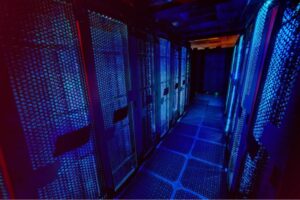Imagine cutting costs, saving time, and becoming more efficient in your business – all through the power of technology. The Industrial Internet of Things (IoT) makes this possible for businesses of all sizes. The benefits of reducing energy usage to improving supply chain management are endless.
It involves connecting physical objects to the internet so that they can send and receive data. This data can be used to improve efficiency, increase product quality, and more. Keep reading to learn more about the benefits of the industrial IoT for businesses!
Contents
What Is IIoT?
IIoT stands for the Industrial Internet of Things. It refers to using connected devices and sensors to collect data in industrial settings. By analyzing production data, it can be used to improve efficiency, optimize production, and make predictions about maintenance needs.
IIoT is sometimes known as Industry 4.0, and is referred to as the fourth industrial revolution. This new manufacturing era is characterized by advanced technologies such as artificial intelligence, 3D printing, and robotics. IIoT plays a significant role in driving this change by providing the data that these technologies need to function effectively.
As IIoT continues to evolve, it is expected to have a transformative impact on how industries operate.
What are the Benefits of Industrial IoT
There are many incredible benefits of Industrial IoT. We will explore some of the most significant ones below.
Automated Data Collection
One of the most significant benefits of industrial IoT is automated data collection. By installing smart sensors on equipment and machines, companies can collect data about everything from production levels to energy usage.
This data can then be used to analyze equipment performance, maintain improve efficiency, and quality control, identify potential problems, and track progress over time. Additionally, automated data collection can help reduce the need for manual data entry, saving companies time and money.
In today’s fast-paced business world, having access to accurate and up-to-date data is essential for success. Industrial IoT provides a simple and effective way to collect this data, giving companies a competitive advantage.
Enhanced Visibility
The IIoT can provide enhanced visibility into industrial operations, helping businesses to identify potential problems and inefficiencies. For example, by monitoring production line data in real-time using IoT asset tracking, companies can identify equipment that is underperforming or areas of the production process causing delays.
By reducing downtime and improving efficiency, the IIoT can help businesses to save money and boost profitability.
Increased Productivity
Another one of the benefits of Industrial IoT is that factories can become more efficient and productive by connecting machines and IIoT devices to the internet. For example, imagine a production line that uses sensors to automatically adjust the speed of assembly based on the number of workers available.
By constantly monitoring and responding to environmental changes, the Industrial IoT can help organizations improve productivity while reducing costs.
Process Compliance and Optimization
Another one of the significant benefits of Industrial IoT is process compliance and optimization. By connecting devices and equipment to the internet, factories can gain unprecedented visibility into their operations. This allows them to identify inefficiencies and potential issues before they cause problems.
Additionally, it provides a wealth of data that can be used to improve processes and procedures. Therefore, Industrial IoT can help smart factories run more smoothly and efficiently, with less downtime and waste.
Moreover, the increased visibility of Industrial IoT can help factories meet regulatory compliance standards more easily. By monitoring their operations more closely, factories can ensure they are always in compliance with the latest regulations.
Reduced Operational Costs
The operational costs in the industrial sector are significantly higher than in any other business domain. One of the major benefits of IIoT can is that it substantially reduce these operating costs by automating tasks, processes, and workflows. By connecting smart devices and machines to the internet, businesses can gain visibility into their operations and make informed decisions that can help them decrease costs.
For example, by monitoring energy usage, companies can identify areas where they can improve efficiency and save money. IIoT can also help businesses automate tasks traditionally done manually, such as material handling or data entry. By doing so, businesses can free up employees to focus on more value-added tasks and reduce labor costs.
Enhanced Employee Safety
Most people think of the internet of things (IoT) as a way to make their lives more convenient. But the IoT can also play a significant role in improving workplace safety. By using IoT asset tracking and connecting industrial equipment and sensors to the internet, employers can gain real-time insights into potential safety hazards.
For example, suppose a machine is overloaded or operating outside its normal parameters. In that case, the employer can be alerted immediately and take steps to correct the situation before it leads to an accident. In addition, by tracking employee whereabouts and monitoring hazardous conditions, the IoT can help employers respond quickly in an emergency.
As the IoT continues to evolve, more safety benefits will likely emerge, making workplaces across industries safer for employees.
Reduced Production Defects
Another benefit of Industrial IoT is that it can reduce production defects. With its advanced sensor technology, it can quickly and easily identify issues along the manufacturing process. Knowing exactly where a problem occurred, you can change the approach to prevent it from happening again. Not only does this save time and money, but it also increases safety by ensuring that products are of the highest quality.
Furthermore, industrial IoT can also be used to monitor equipment performance. By catching issues early, you can avoid more significant problems down the road and extend the life of your equipment.
Predictive Maintenance
Predictive maintenance is a process that uses data to predict when equipment will need maintenance or repair. By identifying potential problems before they occur, predictive maintenance can help companies avoid downtime and keep their equipment running smoothly.
By connecting machines and utilizing IoT asset tracking features, companies can collect data about their equipment and use it to improve their predictive maintenance processes. For example, by monitoring the vibration of a machine, the IoT can help predict when that machine will need maintenance.
Moreover, IoT can also track individual parts’ performance and identify which features are most likely to fail.

How IIoT Is Applied in Different Industries
The Industrial IoT market is being applied across a wide range of industries to improve operations’ efficiency, safety, and quality. Below are a few industries that are already reaping the benefits of the IoT, including:
Healthcare
Today’s healthcare industry is under more pressure than ever to provide high-quality care at a lower cost. In response, many healthcare organizations turn to the Internet of Things (IoT) for help.
Organizations can collect and analyze large amounts of patient data by applying IoT to healthcare to improve care quality and efficiency. For example, IoT-enabled devices can monitor patients’ vital signs and automatically alert caregivers if any changes occur.
Furthermore, IoT can track pathogens and infectious diseases and monitor the supply chain for drugs and medical devices. By harnessing the power of IoT, healthcare organizations can gain valuable tools for improving patient care.
Manufacturing
The IIoT is used to describe the way that digital technologies are being used to connect machines and devices in the manufacturing industry. By connecting devices and appliances to the internet, manufacturers can collect data and gain insights into how their industrial processes are working.
This data can improve efficiency, reduce expenses, and make better-informed decisions about production. IIoT technologies are also being used to create new business models and services.
For example, some manufacturers use IIoT-enabled sensors in the manufacturing or production facility to track the location of parts and products throughout the supply chain. Manufacturers can then use this information to provide customers with real-time updates on their order status.
Businesses are starting to see the benefits of industrial IoT in enhancing manufacturing operations and monitoring the entire production process. As IIoT technology continues to evolve, it is expected that more and more manufacturing operations will adopt it to stay competitive.
Construction
Construction is a critical sector of every economy. It is used to build a country’s critical infrastructure, including its roads, bridges, dams, railways, and buildings. Construction is also a highly labor-intensive business, making it one of the largest employers in the world. With the construction industry accounting for such a large percentage of the global economy, it is not surprising that it has been one of the early adopters of IIoT technologies.
One of the main benefits of industrial IoT in construction is in improving safety. Construction sites are often hazardous places, and accidents are all too common. By using IIoT sensors and devices, construction companies can monitor conditions on-site in real-time and take steps to prevent accidents before they happen.
For example, if the IIoT sensor detects an abnormal temperature or atmospheric pressure change, this could indicate an imminent fire or explosion. By alerting the site foreman, workers can avert this potential disaster.
In addition to improving safety, IIoT is also being used to increase efficiency and productivity on construction sites. For example, by using GPS tracking and integrating IoT asset tracking features, construction companies can more accurately track the location of workers and equipment. This information can optimize traffic flow on site and reduce congestion.
Furthermore, construction companies can adjust their schedules by monitoring weather conditions in real-time to avoid delays due to bad weather. As a result, IIoT is helping construction companies to build better projects faster and more efficiently.
Aviation
The aviation industry has long been an early adopter of technology, implementing innovations such as GPS and glass cockpits to improve safety and effectiveness. In recent years, the industry has begun to embrace the Internet of Things (IoT), with many airlines and airports using connected devices to collect data and improve operations.
The IoT comprises a network of physical objects equipped with sensors and software to collect and exchange data. By connecting aircraft, engines, and other components to the IoT, airlines can improve monitoring performance in real-time and identify potential issues before they cause delays or disruptions. In addition, the IoT can streamline maintenance procedures, reducing the need for costly and time-consuming manual inspections.
As the aviation industry continues to grow, the IoT is expected to play an increasingly important role in helping airlines operate more efficiently and safely.
Oil and Gas
The oil and gas industry has been an early adopter of the Internet of Things (IoT) due to its potential benefits in terms of safety, efficiency, and cost savings. One example of the benefits of IIoT being used in the oil and gas industry is the monitoring of pipelines. By installing sensors along the length of a pipeline, it is possible to detect leaks and other problems early before they cause severe damage.
This not only helps to protect the environment but also reduces the need for costly repairs. In addition, IoT can be used to monitor equipment and optimize production. For instance, tracking the performance of pumps and other critical components makes it possible to identify issues before they lead to downtime or reduced production.
Retail
The retail industry has been quick to adopt IoT technologies in recent years. By integrating sensors and other connected devices into their operations, retailers have gained valuable insights into customer behavior and improved their operations’ efficiency.
In some cases, such as in-store navigation systems, IoT applications have directly improved the customer experience. Other issues, such as inventory management, have helped retailers save time and money.
As the cost of IoT devices continues to decline and the technology becomes more sophisticated, we will likely see even more retail applications for IoT in the future.
These are some industries that are benefiting from the industrial IoT. Before investing in the technology, it is crucial to understand how the IoT works and the potential benefits it offers businesses. With the proper implementation, the IoT can help companies to improve safety, efficiency, and cost savings.
Litum as the Service Provider of IIoT Using RTLS Solutions
Litum is a leading provider of RTLS solutions for the IIoT industry. Our innovative products and services help our customers improve operational efficiency, increase productivity, and reduce downtime.
We offer a complete range of RTLS solutions designed to meet our customers’ specific needs. We utilize UWB RTLS technology in our products, combined with advanced data analytics systems, provide real-time visibility into the location and status of assets. Our goal is to improve the efficiency of our clients and provide the best experience to their customers.
Contact us today if you are looking for a service provider that can provide you with the best possible RTLS solution. We would be happy to discuss your specific needs and requirements and provide you with a quotation. Integrate RTLS into your business operations and enjoy the benefits of IIoT today.






